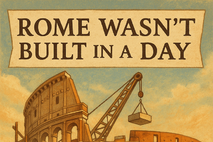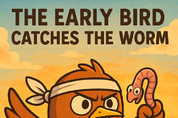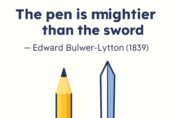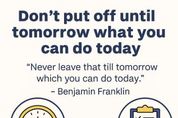English Proverbs
전체기사 보기-

“Actions Speak Louder Than Words”
“Actions Speak Louder Than Words”(Also known unofficially as: “The Show-Don’t-Tell Principle of Life”) Origin and Historical EchoesWith roots as far back as the 1600s, this proverb likely came from sermons or speeches emphasizing morality and credibility. Even Confucius wrote: “A superior man is modest in his speech, but exceeds in his actions.” In short: talk is cheap. Do something. Meaning and InterpretationThis proverb reminds us that intentions mean little without follow-through. What you do—not what you say—defines your values, your integrity, and your impact. It’s a call to live your bel
-

“Rome Wasn’t Built in a Day”
“Rome Wasn’t Built in a Day”Origin and Historical EchoesA medieval French proverb first popularized this idea, later translated into English in the 1500s. It captures one of life’s hard truths: Great things take time. Ancient Rome itself is the perfect metaphor—a sprawling city of innovation and beauty that rose over centuries, not sprints. Meaning and InterpretationThis proverb is a calm whisper amid our turbo-speed culture. It teaches patience, persistence, and the virtue of progress over perfection. Whether it’s building a city, a skill, or a self—it takes time. Applications in Education1.
-

“You Can’t Judge a Book by Its Cover”
“You Can’t Judge a Book by Its Cover”Origin and Historical EchoesThis proverb dates back to the mid-19th century, first appearing in the 1860s in George Eliot’s novel The Mill on the Floss. The metaphor is simple: appearances are deceiving. But the sentiment? Ancient. From Aesop’s fables to Confucian philosophy, wise folks everywhere warned against judging quickly. The outside rarely reveals the whole truth. Meaning and InterpretationThis phrase cautions against forming opinions based on looks, labels, or first impressions. That flashy book might be fluff. That plain one? A masterpiece. It rem
-

“You Can’t Judge a Book by Its Cover”
“You Can’t Judge a Book by Its Cover”Origin and Historical EchoesThis proverb dates back to the mid-19th century, first appearing in the 1860s in George Eliot’s novel The Mill on the Floss. The metaphor is simple: appearances are deceiving. But the sentiment? Ancient. From Aesop’s fables to Confucian philosophy, wise folks everywhere warned against judging quickly. The outside rarely reveals the whole truth. Meaning and InterpretationThis phrase cautions against forming opinions based on looks, labels, or first impressions. That flashy book might be fluff. That plain one? A masterpiece. It rem
- 관리자 기자
- 2025-07-09 07:37
-

“The Early Bird Catches the Worm”
“The Early Bird Catches the Worm”(Also known unofficially as: “Team Sunrise’s Motto”) Origin and Historical EchoesThis cheerful nugget of advice first chirped its way into English in the 1600s and has stuck around like a morning rooster ever since. While no one knows the exact first tweet (pun intended), the phrase likely hatched from farmers’ wisdom and early-riser ethics common across agrarian societies. The message? Those who act first, win first. Even Roman wisdom reflects similar sentiment—consider “Audentes fortuna iuvat” (Fortune favors the bold). But the early bird doesn’t just get luc
- 관리자 기자
- 2025-07-09 07:33
-

The Pen Is Mightier Than the Sword
The Pen Is Mightier Than the Sword"The pen is mightier than the sword." — Edward Bulwer-Lytton (1839) ️ Origin and Historical BackgroundThis famous proverb was coined by Edward Bulwer-Lytton, an English author and politician, in his 1839 play Richelieu; Or the Conspiracy. In the play, Cardinal Richelieu, a clergyman and statesman, utters the line: "Beneath the rule of men entirely great,The pen is mightier than the sword." The expression quickly gained popularity, emphasizing the power of communication, writing, and ideas over violence and physical force. But the idea predates Bulwer-Lytton. E
- 관리자 기자
- 2025-06-11 15:45
-

"Don’t Put Off Until Tomorrow What You Can Do Today"
"Don’t Put Off Until Tomorrow What You Can Do Today"(Also known unofficially as: “Procrastination’s Worst Enemy”) ️ Origin and Historical EchoesThis proverb is often attributed to Benjamin Franklin, that marvelously multitasking Founding Father who, when not inventing bifocals or taming lightning, dispensed practical wisdom in Poor Richard’s Almanack. However, its sentiment predates Franklin, echoing back to Latin maxims like “Carpe diem” (Seize the day) and even to Hesiod, who cautioned against idle delay in ancient Greek literature. It’s a timeless commandment in the temple of productivity—a
- 관리자 기자
- 2025-06-11 15:38
-

A Little Knowledge Is a Dangerous Thing
A Little Knowledge Is a Dangerous ThingOrigin and HistoryThis proverb originates from the English poet Alexander Pope, who wrote in his 1709 Essay on Criticism: “A little learning is a dang’rous thing;Drink deep, or taste not the Pierian spring.” The “Pierian spring” symbolizes the source of knowledge in Greek mythology. Pope’s warning was that superficial knowledge without deeper understanding can lead to overconfidence and mistakes. MeaningThe proverb highlights that: Knowing only part of a subject can lead to false confidence. Without full understanding, one may make poor decisions, as
- 관리자 기자
- 2025-06-11 15:10
-

Tell Me and I Forget. Teach Me and I Remember. Involve Me and I Learn.
Tell Me and I Forget. Teach Me and I Remember. Involve Me and I Learn.Origin and HistoryThis widely quoted proverb is often attributed to Benjamin Franklin, though its roots may go deeper, possibly influenced by Confucian philosophy or earlier oral traditions. The exact source is debated, but the core idea—that active involvement deepens understanding—has long been central to effective education methods across cultures. Confucius once said, "I hear and I forget. I see and I remember. I do and I understand."—a sentiment nearly identical in spirit. Whether East or West, the wisdom remains univer
- 관리자 기자
- 2025-06-11 14:50
-
 Entertainment · Broadcasting
Fair Play Menarini International Award, 29th Award Ceremony marked by waves of emotion
Entertainment · Broadcasting
Fair Play Menarini International Award, 29th Award Ceremony marked by waves of emotion
-
 Entertainment · Broadcasting
The Rose, the first Korean band to perform at Coachella, confirms Seoul concert on August 30 for “Once Upon a WRLD”
Entertainment · Broadcasting
The Rose, the first Korean band to perform at Coachella, confirms Seoul concert on August 30 for “Once Upon a WRLD”
-
 Culture · Events
Incheon Port Authority kicks off the 6th Incheon International Marine Forum in Songdo, Incheon, to look into the future of the global marine industry
Culture · Events
Incheon Port Authority kicks off the 6th Incheon International Marine Forum in Songdo, Incheon, to look into the future of the global marine industry
-
 Culture · Events
Seocho Symphony Orchestra to hold performances in Berlin, Germany, and London, England, commemorating the 80th anniversary of liberation and the 75th anniversary of the Korean War
Culture · Events
Seocho Symphony Orchestra to hold performances in Berlin, Germany, and London, England, commemorating the 80th anniversary of liberation and the 75th anniversary of the Korean War
-
 Culture · Events
Gyeonggi Province to hold its largest job fair for middle-aged and older workers on the 9th. 1,000 jobs to be filled.
Culture · Events
Gyeonggi Province to hold its largest job fair for middle-aged and older workers on the 9th. 1,000 jobs to be filled.
-
 International
Jeju's soul resonates in Rome... Singing of the pain and reconciliation of Jeju 4·3
International
Jeju's soul resonates in Rome... Singing of the pain and reconciliation of Jeju 4·3
-
 International
Seoul City establishes a foothold for K-Beauty and fashion to enter the European market, promoting Milan as a base
International
Seoul City establishes a foothold for K-Beauty and fashion to enter the European market, promoting Milan as a base
-
 Medical · Health
Korean Centers for Disease Control and Prevention: Increase in hand, foot, and mouth disease among infants and young children! Follow preventive measures and maintain good hygiene to stay healthy.
Medical · Health
Korean Centers for Disease Control and Prevention: Increase in hand, foot, and mouth disease among infants and young children! Follow preventive measures and maintain good hygiene to stay healthy.
-
 Medical · Health
Korean Centers for Disease Control and Prevention: Injured patients account for the largest proportion of hospitalized patients; falls are the main cause
Medical · Health
Korean Centers for Disease Control and Prevention: Injured patients account for the largest proportion of hospitalized patients; falls are the main cause
-
 Medical · Health
WHO and international health experts visit Wanju local food production sites
Medical · Health
WHO and international health experts visit Wanju local food production sites
오피니언
-
Seong Ki-sun's Book Launch Event ‘Education in Turmoil’...Seeking Hope for Public Education Through Basic, Relationship, Growth (BRG)
On the 6th, the publication celebration for Professor Sung Ki-sun's (Catholic University of Korea, former President of the Korea Institute for Curriculum and Evaluation) book ‘Educational Turmoil’ was held at the Gyeonggi University Teleconvention Center. Sung was the 2022 Democratic Progressive Single Candidate for Gyeonggi Superintendent of Education. The event was a great success, attended by approximately 800 key figures from education, politics, academia, civic groups, and the public. Attendees included Gyeonggi Province Governor Kim Dong-yeon, Bucheon Mayor Cho Yong-ik, former Minister o
-
JP EDU - Hidden Opportunities in Japan: English-Taught International Studies Programs Open Doors to Prestigious Universities
Can you enter a top Japanese university without speaking Japanese? Can you enter a top Japanese university without speaking Japanese? Surprisingly, the answer is yes. Much like Korea’s Yonsei University Underwood International College or the Songdo Global Campus, more than 40 Japanese universities now offer full-degree programs conducted entirely in English. These English-taught programs—often called G30 programs—are especially popular in the field of International Studies. Admission is based on a student’s academic record (GPA) and English proficiency, rather than Japanese language ability. A
-
2026 대한민국영어신문 주니어 영어 기자단 모집
2026 대한민국영어신문 주니어 영어기자단 모집 안내영어로 세상을 보고, 글로 성장하는 주니어 기자단! 1. 모집 대상 모집 인원: 총 00명 한정 모집 지원 자격: 초등학교 2학년 ~ 고등학교 2학년 학생 및 동일연령 청소년 (영어에 관심이 있고, 글쓰기와 인터뷰 활동에 도전하고 싶은 학생 누구나) 2. 활동 내용 영어신문 기자로서 기사 작성, 인터뷰, 취재, 콘텐츠 기획 참여 온라인 영어 학습 콘텐츠 무료 제공 및 기사 첨삭 지도를 통한 영어 실력 향상 정기 영어 특강, 현장 캠프, 멘토링, 전문가 영어학습 컨설팅 제공 작성한 기사는 대한민국영어신문 공식 온라인 플랫폼에 게재 3. 혜택 및 특전 영어기자증 발급 및 임명식 진행 우수기자 시상 및 특전 제공 1:1 기사첨삭 및 학습 피드백 온라인 영어 학습 콘텐츠 무료 제공 연간 36회 이상 기사 게재 기회 부여 -> 공식 칼럼 섹션 제공 4. 모집 일정 신청 기간: 2025년 1월 2일(금)부터 신청 방법: 1) 대한민국영어신문 홈페이지 온라인 폼 신청 * 아래 링크 클릭 기자단 신청 링크 (클릭!!!) 2) 영문 자기소개서(양
-
Lotte Scholarship Foundation Provides 300 Job Seekers with 300 Million Won in Scholarships and Employment Training Support
The Lotte Scholarship Foundation (Chairwoman Jang Hye-seon) held the “Shin Kyuk-ho Lotte Scholarship Award Ceremony for Job Seekers” on Tuesday, May 5, at the Lotte Retail Academy in Yeongdeungpo-gu, Seoul, and presented a total of 300 million won in scholarships to 300 job seekers in the media and engineering fields. This year's scholarship recipients will each receive a living expense scholarship of 1 million won, and will also have the opportunity to participate in various job experience education programs to learn about their desired fields and develop their expertise. The education progra
-
2026-01-29 23:44
11
-
2026-01-28 23:36
No. 6 Reporter
-
2025-12-09 14:30
Seong Ki-sun's Book Launch Event ‘Education in Turmoil’...Seeking Hope for Public Education Through Basic, Relationship, Growth (BRG)
-
2025-11-04 13:48
JP EDU - Hidden Opportunities in Japan: English-Taught International Studies Programs Open Doors to Prestigious Universities
-
2025-10-27 11:03
2026 대한민국영어신문 주니어 영어 기자단 모집

























